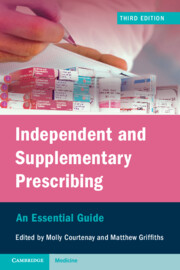Book contents
- Frontmatter
- Contents
- List of Contributors
- Foreword
- Preface
- 1 Non-Medical Prescribing: An Overview
- 2 Non-Medical Prescribing in a Multidisciplinary Team Context
- 3 Consultation Skills and Decision Making
- 4 Legal Aspects of Independent and Supplementary Prescribing
- 5 Ethical Issues in Independent and Supplementary Prescribing
- 6 Psychology and Sociology of Prescribing
- 7 Applied Pharmacology
- 8 Monitoring Skills
- 9 Promoting Concordance in Prescribing Interactions
- 10 Evidence-Based Prescribing
- 11 Extended/Supplementary Prescribing: A Public Health Perspective
- 12 Calculation Skills
- 13 Prescribing in Practice: How It Works
- 14 Minimising the Risk of Prescribing Error
- 15 Education and Training to Become a Prescriber
- 16 Antimicrobial Prescribing
- Index
12 - Calculation Skills
Published online by Cambridge University Press: 23 December 2021
- Frontmatter
- Contents
- List of Contributors
- Foreword
- Preface
- 1 Non-Medical Prescribing: An Overview
- 2 Non-Medical Prescribing in a Multidisciplinary Team Context
- 3 Consultation Skills and Decision Making
- 4 Legal Aspects of Independent and Supplementary Prescribing
- 5 Ethical Issues in Independent and Supplementary Prescribing
- 6 Psychology and Sociology of Prescribing
- 7 Applied Pharmacology
- 8 Monitoring Skills
- 9 Promoting Concordance in Prescribing Interactions
- 10 Evidence-Based Prescribing
- 11 Extended/Supplementary Prescribing: A Public Health Perspective
- 12 Calculation Skills
- 13 Prescribing in Practice: How It Works
- 14 Minimising the Risk of Prescribing Error
- 15 Education and Training to Become a Prescriber
- 16 Antimicrobial Prescribing
- Index
Summary
The competence framework for prescribers states that they should be able to accurately complete and routinely check calculations relevant to prescribing and practical dosing. Prescribers should know about common types of medication error and how to prevent them. The incorrect application of dosing equations is considered a major contributor to preventable adverse events associated with the prescribing of medicines. Anyone required to check calculations performed by others must be competent to perform such calculations independently. A complex calculation is any process requiring more than one step in the preparation and/or administration of a medicine to a patient. Throughout the chapter there are useful tips on how to reduce the risks associated with complex calculations. This chapter includes information on units of measurement, units of amount and various methods used to calculate drug concentration, dose and rate of drug administration. Also included are simple pharmacokinetic concepts and calculations specific to palliative care. At the end of each section there are sample calculations (with answers) allowing readers to test their calculation abilities
Keywords
- Type
- Chapter
- Information
- Independent and Supplementary PrescribingAn Essential Guide, pp. 224 - 262Publisher: Cambridge University PressPrint publication year: 2022

